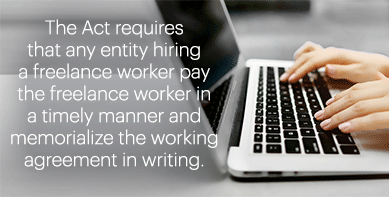Illinois is the First State to Enact Freelance Worker Protection Act
By Allison Sues, Senior Employment Law Counsel
Published September 19, 2023

Illinois has expanded its employment-related statutory scheme by recently passing a first-of-its-kind, state-level law protecting freelance workers. The Act requires that any entity hiring a freelance worker (the “hiring party”) pay the freelance worker in a timely manner and memorialize the working agreement in writing. The Act also protects freelance workers by prohibiting any sort of retaliation for a freelance worker invoking the protections of this new law. The Act goes into effect July 2024 and will not have retroactive effect on freelance worker agreements entered before this effective date. The key takeaways from this new law are provided below.
Who is protected under this Act?
The Act protects freelance workers who have been hired or retained to provide services or products in Illinois or for a hiring party based in Illinois in exchange for compensation equal to or greater than $500. The $500 threshold can be reached either through a single contract or through a combination of contracts in the immediately preceding 120 days. Freelance workers are distinct from employees based on their higher level of control and direction as it relates to their work for the hiring party. The statute exempts construction workers, workers performing services as an employee for a contractor who engages in construction, and all foreign, federal, state, and local governmental entities including school districts, libraries and park districts.
What pay protections does the Act provide to freelance workers?
A hiring party must pay the freelance worker within 30 days of completion of the freelance worker’s service or delivery of the worker’s product. A hiring party cannot ask a freelance worker to accept less than full payment by the end of the 30-day window. In other words, while a hiring party can pay the freelance worker in installments, the hiring party must still complete full payment by the end of the 30-day window.
What are the requirements for a hiring party to execute a written contract with freelance workers?
Anytime a hiring party retains a freelance worker to provide products or services valued at more than $500, it must provide a written contract memorializing this agreement to the freelance worker via mail or email. The hiring party must retain this contract for a period of two years. The written contract should include: (1) contact information for both parties to the agreement; (2) the products and services to be provided, as well as the value and/or rate of the products and services and method of payment; (3) a payment date no later than 30 days after receipt of products or services; (4) a deadline for the freelance worker to provide the products or services to the hiring party if necessary to meet the hiring party’s internal procedures for timely payment. The Illinois Department of Labor (IDOL) will provide a model contract on its website on an unspecified date in the future.
What additional protections does this Act provide for freelance workers?
The Act explicitly prohibits hiring parties from subjecting freelance workers to intimidation, threats, discrimination, harassment, or retaliation of any kind for a freelance worker’s exercise of any rights under this law.
What actions can freelance workers take based on violations of this Act?
Freelance workers may file complaints against hiring parties with the IDOL or file a complaint directly in the Illinois Circuit Court. The Act’s right of action provisions also allows freelance workers to file class actions on behalf of similarly situated freelance workers and the Illinois Attorney General to initiate civil actions on freelance workers’ behalf. Penalties for violations of this Act vary but all include the cost for suit and attorneys’ fees. For untimely payment claims, freelance workers may recover double the amount of the underpayment. For a claim alleging a failure to provide a written contract, freelance workers may recover the greater of the value of the contract or $500. For discrimination or retaliation claims, freelance workers may recover the value of the underlying contract for each established violation.
HR Source members with questions on the Illinois Freelance Worker Protection Act should contact our Employment Law Services Department for assistance through the HR Hotline online or at 800-448-4584.